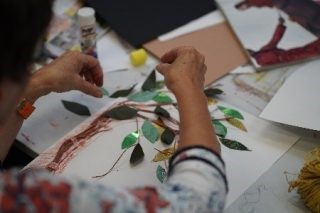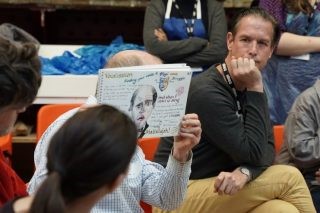Patterns of Perception – Outstanding Public Engagement Project 2020
The Outstanding Public Engagement Project Award recognised the team behind the Patterns of Perception Project. This collaboration between Dr Rimona Weil and Dr Christian Lambert and their teams at UCL, individuals with Parkinson’s Disease, Central St Martins, the English National Ballet and artist, Ruairiadh O’Connell, aimed to find better ways to dispel misconceptions and communicate real insights into the experiences of those living with Parkinson’s Disease.
 In November 2018, planning began for a series of workshops aiming to explore and understand the experiences and perceptions related to Parkinson’s Disease through interweaving science, dance and visual arts methods. The workshops, which ran in Autumn 2019, ranged from textiles to dance and art, during which participants created visual diaries to reflect on their daily lives. They also worked with the team to generate a vocabulary of words that epitomised their lived experience of Parkinson’s, identifying common themes: strength, resilience, fear, hope and humour. They used these words to paint textiles with these themes and as focus points in dance. The project culminated in an exhibition at Central St Martins from 4th March 2020, which showcased the creative outputs from the workshop, as well as a seven minute film documenting the project:
In November 2018, planning began for a series of workshops aiming to explore and understand the experiences and perceptions related to Parkinson’s Disease through interweaving science, dance and visual arts methods. The workshops, which ran in Autumn 2019, ranged from textiles to dance and art, during which participants created visual diaries to reflect on their daily lives. They also worked with the team to generate a vocabulary of words that epitomised their lived experience of Parkinson’s, identifying common themes: strength, resilience, fear, hope and humour. They used these words to paint textiles with these themes and as focus points in dance. The project culminated in an exhibition at Central St Martins from 4th March 2020, which showcased the creative outputs from the workshop, as well as a seven minute film documenting the project:
In total, 15 people with Parkinson’s Disease took part in the three workshops. They reflected that by taking part, they felt they could tell their story and were able to communicate that:
“It is not just a motor condition, there are many aspects to living with Parkinson’s disease”
“There is much that is visible but also much that is invisible”
“It can be tiring, frustrating, annoying but there is still plenty to enjoy. Don’t pity them; treat them as people”
Parkinson’s disease (PD) is a common, age-related neurodegenerative condition. In the UK, two people are diagnosed with PD every hour. There is a major discrepancy between what people think Parkinson’s disease is, and the actual experience living with the condition. Furthermore, there is substantial variability in the symptoms experienced between different individuals, with many being invisible to the naked eye. Bridging this disconnect would help individuals with PD, their families and professionals who help care for the condition. As one participant said:
“Everyone experiences PD differently; I wish I knew what this meant earlier. I thought it was that we all take different roads to the same destination, but in reality, the destinations are all different too”
 There are two research programmes at our Centre that focus on different aspects of the variability between individuals with PD. Dr Rimona Weil is a neurologist and neuroscientist interested in vision in Parkinson’s and early detection of dementia in people with Parkinson’s. Alongside her team members, Naomi Hannaway (Research Assistant) and Louise-Ann Leyland (Research Fellow), she aims to identify patients at highest risk of dementia and to understand the brain mechanisms that cause these cognitive changes. Dr Christian Lambert and his Research Assistants, Gabrielle Sheehan and Nicola Smith, use novel anatomical MRI, clinical and genetic data to understand why Parkinson’s is so variable, to provide tools for earlier diagnosis and personalised treatment.
There are two research programmes at our Centre that focus on different aspects of the variability between individuals with PD. Dr Rimona Weil is a neurologist and neuroscientist interested in vision in Parkinson’s and early detection of dementia in people with Parkinson’s. Alongside her team members, Naomi Hannaway (Research Assistant) and Louise-Ann Leyland (Research Fellow), she aims to identify patients at highest risk of dementia and to understand the brain mechanisms that cause these cognitive changes. Dr Christian Lambert and his Research Assistants, Gabrielle Sheehan and Nicola Smith, use novel anatomical MRI, clinical and genetic data to understand why Parkinson’s is so variable, to provide tools for earlier diagnosis and personalised treatment.
 The Patterns of Perception project demonstrated the power of bringing together different disciplines including artists, musicians, dancers and scientists. It brought out the personalities of the individuals taking part and empowered them to tell their own stories. Delivering the workshops in the inspirational settings of Central Saint Martin’s School of Art and the English National Ballet’s London City Island Venue, was particularly valuable as it removed the usual patient-doctor hierarchies and the hospital setting.
The Patterns of Perception project demonstrated the power of bringing together different disciplines including artists, musicians, dancers and scientists. It brought out the personalities of the individuals taking part and empowered them to tell their own stories. Delivering the workshops in the inspirational settings of Central Saint Martin’s School of Art and the English National Ballet’s London City Island Venue, was particularly valuable as it removed the usual patient-doctor hierarchies and the hospital setting.
Importantly, the project also complemented the research programs by providing a voice for lived experience of individuals with PD. These patient-focused insights have since proved valuable both for research and also in direct clinical care. For example, the workshops showed first-hand how speech and movements improved when driven by music and poetry with drawing of spirals, a task often used in the clinic, becoming smoother and clearer with accompaniment of beautiful music.
 Christian and Rimona reflected on how the project and experience has shaped and influenced the way they now think about their clinical and neuroscientific challenges. They now plan to build on these lessons to tackle specific challenges in their research programmes, such as the stigma of dementia in PD or pre-clinical diagnostics in those without symptoms.
Christian and Rimona reflected on how the project and experience has shaped and influenced the way they now think about their clinical and neuroscientific challenges. They now plan to build on these lessons to tackle specific challenges in their research programmes, such as the stigma of dementia in PD or pre-clinical diagnostics in those without symptoms.
Congratulations to Rimona, Christian and their teams, we look forward to seeing how this project develops in the future.
Awarded May 2020
